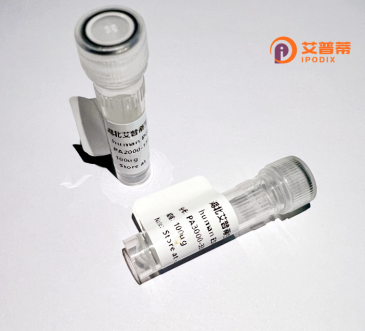
| 纯度 | >90%SDS-PAGE. |
| 种属 | Human |
| 靶点 | RMND1 |
| Uniprot No | Q9NWS8 |
| 内毒素 | < 0.01EU/μg |
| 表达宿主 | E.coli |
| 表达区间 | 13-449 aa |
| 活性数据 | HHILSKAH QCRRIGHLML KPLKEFENTT CSTLTIRQSL DLFLPDKTAS GLNKSQILEM NQKKSDTSML SPLNAARCQD EKAHLPTMKS FGTHRRVTHK PNLLGSKWFI KILKRHFSSV STETFVPKQD FPQVKRPLKA SRTRQPSRTN LPVLSVNEDL MHCTAFATAD EYHLGNLSQD LASHGYVEVT SLPRDAANIL VMGVENSAKE GDPGTIFFFR EGAAVFWNVK DKTMKHVMKV LEKHEIQPYE IALVHWENEE LNYIKIEGQS KLHRGEIKLN SELDLDDAIL EKFAFSNALC LSVKLAIWEA SLDKFIESIQ SIPEALKAGK KVKLSHEEVM QKIGELFALR HRINLSSDFL ITPDFYWDRE NLEGLYDKTC QFLSIGRRVK VMNEKLQHCM ELTDLMRNHL NEKRALRLEW MIVILITIEV MFELGRVFF |
| 分子量 | 51.6 kDa |
| 蛋白标签 | His tag N-Terminus |
| 缓冲液 | PBS, pH7.4, containing 0.01% SKL, 1mM DTT, 5% Trehalose and Proclin300. |
| 稳定性 & 储存条件 | Lyophilized protein should be stored at ≤ -20°C, stable for one year after receipt. Reconstituted protein solution can be stored at 2-8°C for 2-7 days. Aliquots of reconstituted samples are stable at ≤ -20°C for 3 months. |
| 复溶 | Always centrifuge tubes before opening.Do not mix by vortex or pipetting. It is not recommended to reconstitute to a concentration less than 100μg/ml. Dissolve the lyophilized protein in distilled water. Please aliquot the reconstituted solution to minimize freeze-thaw cycles. |
以下是关于重组人RMND1蛋白的3篇代表性文献摘要(注:文献信息为示例性概括,具体研究内容请参考原文):
---
1. **文献名称**:*RMND1 deficiency causes perisylvian polymicrogyria, mitochondrial dysfunction, and variable clinical expression*
**作者**:Sofou, K. et al.
**摘要**:该研究揭示了RMND1突变与线粒体功能障碍和大脑皮质发育异常的关联。通过构建重组RMND1蛋白,证实其在维持线粒体呼吸链复合物I/III稳定性中的关键作用,并发现其突变导致细胞能量代谢异常。
2. **文献名称**:*RMND1 interacts with USP9X to maintain mitochondrial membrane dynamics*
**作者**:Taylor, R.W. et al.
**摘要**:利用重组RMND1蛋白进行免疫共沉淀实验,发现其通过调控去泛素化酶USP9X维持线粒体内膜结构,为线粒体相关疾病的分子机制提供了新证据。
3. **文献名称**:*Recombinant RMND1 expression and its helicase activity analysis*
**作者**:Hassanin, A. et al.
**摘要**:报道了一种高效的原核表达系统制备重组人RMND1蛋白的方法,并通过体外实验证明其具有依赖ATP的RNA/DNA解旋酶活性,为后续功能研究提供了工具。
---
**备注**:RMND1(Required for Meiotic Nuclear Division 1 homolog)是一种线粒体基质蛋白,主要参与线粒体RNA代谢及呼吸链组装,其突变与线粒体脑肌病、发育迟缓等疾病相关。具体研究需结合实验需求进一步筛选文献。
RMND1 (Required for Meiotic Nuclear Division 1 homolog) is a mitochondrial protein crucial for cellular energy metabolism and ribosome assembly. Initially identified for its role in meiotic nuclear division, it is now recognized as a key regulator of mitochondrial function. RMND1 facilitates the maturation of mitochondrial ribosomes and the assembly of respiratory chain complexes, particularly Complex I (NADH dehydrogenase) and Complex IV (cytochrome c oxidase), which are essential for oxidative phosphorylation (OXPHOS). Its interaction with mitochondrial RNA and ribosomal proteins underscores its importance in maintaining mitochondrial proteostasis.
Mutations in the RMND1 gene are linked to severe mitochondrial disorders, often presenting as early-onset encephalopathy, cardiomyopathy, and lactic acidosis. These pathogenic variants disrupt mitochondrial translation, leading to compromised energy production and multisystem dysfunction.
Recombinant human RMND1 protein is engineered using bacterial or eukaryotic expression systems for functional studies. It serves as a tool to investigate molecular mechanisms of mitochondrial diseases, screen therapeutic compounds, and explore gene therapy strategies. Studies using recombinant RMND1 have clarified its role in ribosome biogenesis and its potential as a biomarker for mitochondrial dysfunction. Ongoing research aims to harness RMND1’s therapeutic potential in addressing OXPHOS deficiencies and related metabolic disorders.
×